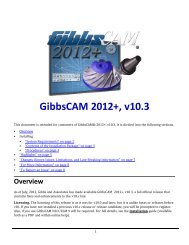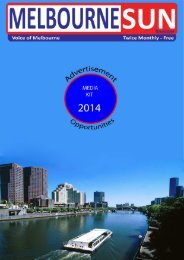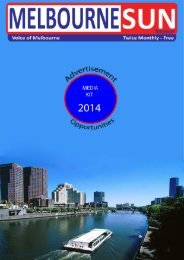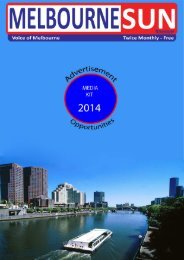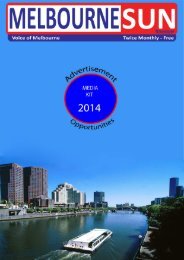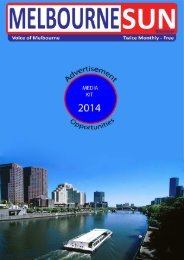- Page 1 and 2:
BASIC ENGLISH GRAMMAR
- Page 3 and 4:
Librsry of Congrcecl Cataloging-ln-
- Page 5 and 6:
2-10 THE SIMPLE PRESENT: YESNO QUES
- Page 7 and 8:
Chapter 7 EXPRESSING ABILITY USING
- Page 9 and 10:
This Page Intentionally Left Blank
- Page 11 and 12:
Writing English grammar texts is a
- Page 13 and 14:
1-1 NOUN + IS + NOUN: SINGULAR NOUN
- Page 15 and 16:
1-2 NOUN + ARE + NOUN: PLURAL 1.- +
- Page 17 and 18:
EXERCISE 8-ORAL (BOOKS CLOSED): Wha
- Page 19 and 20:
EXERCISE 1 1 : Complete the sentenc
- Page 21 and 22:
. ADJECTIVE NOUN + BE + (a) Aball i
- Page 23 and 24:
EXERCISE 15-ORAL (BOOKS CLOSED): Us
- Page 25 and 26:
A turtle Airplanes They fast. slow.
- Page 27 and 28:
. -..: . .. -- . . ,~ ~... .~ -~ ..
- Page 29 and 30:
The cat is the desk. The cat is two
- Page 31 and 32:
SUBJECT + BE + NOUN (a) I m a stude
- Page 33 and 34:
EXERCISE 27: Make questions and giv
- Page 35 and 36:
10 QUESTIONS WITH BE: USING WHERE W
- Page 37 and 38:
SINGULAR PLURAL I (a) I have apen.
- Page 39 and 40:
W EXERCISE 35: Complete the sentenc
- Page 41 and 42:
(a) I have a book in my hand. This
- Page 43 and 44:
EXERCISE d2-ORAL (BOOKS CLOSED): Us
- Page 45 and 46:
EXERCISE 46: Study the names of the
- Page 47 and 48:
EXERCISE 49: Draw a picture and the
- Page 49 and 50:
9. Mr. Lee have a brown coat. 10. T
- Page 51 and 52:
3. A: this? I I , . . ' , , ! ' , ;
- Page 53 and 54:
~ c EXERCISE 56REVIEW: Work in pair
- Page 55 and 56:
CHAPTER 2 Expressing Present 'I lmc
- Page 57 and 58:
2 USING FREQUENCY ADVERBS: ALWAYS,
- Page 59 and 60:
EXERCISE 4: Add the PREQUW~CY AD= i
- Page 61 and 62:
Find the VEM in each sentence. Pron
- Page 63 and 64:
4 EXERCISE-% UG-fie wards in italic
- Page 65 and 66:
PRONUNCIATION (a) rub + rubs dlzl .
- Page 67 and 68:
10. Mr. Cook (say, always)* hello t
- Page 69 and 70:
~ 13. have, not This city - nice we
- Page 71 and 72:
EXERCISE 17-ORAL (BOOKS CLOSED): Us
- Page 73 and 74:
B: (I do exercises every morning.)
- Page 75 and 76:
2-1 1 THE SIMPLE PRESENT: ASKING IN
- Page 77 and 78:
2- 12 THE SIMPLE PRESENT: ASKING IN
- Page 79 and 80:
EXERCISE 26: Complete the questions
- Page 81 and 82:
10. A: B: The blue whale. (The bigg
- Page 83 and 84:
2-14 USING ITTO TALK ABOUT TIME QUE
- Page 85 and 86:
EXERCISE 32: Complete the sentences
- Page 87 and 88:
EXERCISE 36-REVIEW: Is/, lzl, or la
- Page 89 and 90:
A: No, I don't. I (spend) as little
- Page 91 and 92:
W EXERCISE 39-REVIEW: Correct the m
- Page 93 and 94:
6. A: Do you like ? B: Yes, of cour
- Page 95 and 96:
I I P- Expressing Present Tim I I 3
- Page 97 and 98:
EXERCISE 3--ORAL (BOOKS CLOSED): Ac
- Page 99 and 100:
EXERCISE 6: Write the -in# forms fo
- Page 101 and 102:
B: Yes, (Anna is eating lunch.) 4.
- Page 103 and 104:
3. A: B: My grammar book. (I'm read
- Page 105 and 106:
12. It (rain) a lot in this city, b
- Page 107 and 108:
,. EXERCISE 13: Use the words in pa
- Page 109 and 110:
3-7 NEED AND WANT + A NOUN OR AN IN
- Page 111 and 112:
: 5 WOULD LIKE (a) I'm thirsty. I w
- Page 113 and 114:
3. I like to every day. 4. I would
- Page 115 and 116:
EXERCISE 23-ORAL: State an opinion
- Page 117 and 118:
(39) the bird. Bobby is busy with h
- Page 119 and 120:
EXERCISE 29-ORAL: Ask a classmate a
- Page 121 and 122:
W EXERCISE 35--ORAL: Pair up with a
- Page 123 and 124:
H. The man is in back of the bus. T
- Page 125 and 126:
d ( F ) & T h e dog is in of the ca
- Page 127 and 128:
A. VOCABULARY CHECKLIST study at th
- Page 129 and 130:
A. VOCABULARY CHECKLIST cash a chec
- Page 131 and 132:
.:'~ A. VOCABULARY CHECWST watch TV
- Page 133 and 134:
~ ~~~ A. VOCABULARY CHECKLIST sk@ d
- Page 135 and 136:
joggers and squirrels. She (relax)
- Page 137 and 138:
10. Kunio at a restaurant right now
- Page 139 and 140:
EXERCISE 2: Describe the grammatica
- Page 141 and 142:
EXERCISE 3: Find the ADJECTIVES and
- Page 143 and 144:
EXERCISE 6: Complete the sentences.
- Page 145 and 146:
10. A: Hi, Ann. How do you like you
- Page 147 and 148:
7 1 LIST B: knife thief wife c; '*i
- Page 149 and 150:
EXERCISE 10: Practice the pronuncia
- Page 151 and 152:
A List 1 Things in nam . .--* air L
- Page 153 and 154:
12. COUNT NONCOUNT We have an assig
- Page 155 and 156:
14. Miss Anderson has job. * , + ~
- Page 157 and 158:
13. I wantto make sandwich. 14. I n
- Page 159 and 160:
20, fruit I'm hungry. I would like
- Page 161 and 162:
14. Are you hungry? Could I get you
- Page 163 and 164:
EXERCISE 27-ORAL: Change a lot of t
- Page 165 and 166:
EXERCISE 31: Use these words in the
- Page 167 and 168:
12. 1 have a problem. I need your h
- Page 169 and 170:
EXERCISE 34: Complete the sentences
- Page 171 and 172:
1 4-1 1 USING 0 (NO ARTICLE) TO MAK
- Page 173 and 174:
W EXERCISE 38-ORAL (BOOKS CLOSED):
- Page 175 and 176:
16. A: Listen. Do you hear a noise?
- Page 177 and 178:
3. Snow falls. subject verb object
- Page 179 and 180:
EXERCISE 45- REVIEW: Correct the er
- Page 182 and 183:
PRESENT TUlE PAST TIME (a) I am in
- Page 184 and 185:
8. Mr. and Mrs. Jones are at home t
- Page 186 and 187:
5. (the weather \ hot in New York C
- Page 188 and 189:
I SIMPLB PRESEN SIMPLE PAST: SIMPLE
- Page 190:
EXERCISE 8: Use yesterday or last.
- Page 193 and 194: 23. I have my books with me. I didn
- Page 195 and 196: EXERCISE 12: Give the -ed and ing f
- Page 197 and 198: You may not know the meanings of th
- Page 199 and 200: 6. A car accident at the corner of
- Page 201 and 202: 5-9 THE SIMPLE PAST: IRREGULAR VERB
- Page 203 and 204: 5- 10 THE SIMPLE PAST: NEGATIV Sbwn
- Page 205 and 206: 1 1. My husband (come, not) home fo
- Page 207 and 208: 5. A: Where you yesterday? B: I at
- Page 209 and 210: EXERCISE 29-ORAL (BOOKS CLOSED): As
- Page 211 and 212: ,A 2. A: (Ms. Carter, teach) class
- Page 213 and 214: 1 1. I almost (hawe) an accident ye
- Page 215 and 216: .... 9. A: B: Five weeks ago. (I ca
- Page 217 and 218: EXERCISE 39: Use your own words to
- Page 219 and 220: 6. A: B: Science. (I'm interested i
- Page 221 and 222: 6. A: B: My cousin. (My cousin visi
- Page 223 and 224: (a) What does "pretty" mean? (b) Wh
- Page 225 and 226: 4. send-sent I send my mother a gif
- Page 227 and 228: 5-18 BEFORE AND AFTER IN TIME CLAUS
- Page 229 and 230: 1. She ate breakfast. She went to w
- Page 231 and 232: EXERCISE 56: Add a capital letter a
- Page 233 and 234: (pay) my bill. Then we (leave) the
- Page 235 and 236: . 19. break 25. ring 20. stop 26. m
- Page 237 and 238: BEAR: Good morning, Fish. FISH: Goo
- Page 239 and 240: BEAR: I (hold) PISH: Oh no! You (tr
- Page 241: This Page Intentionally Left Blank
- Page 245 and 246: 1 EXERCISE 4-ORAL (BOOKS CLOSED): L
- Page 247 and 248: EXERCISE 7: Complete the sentences.
- Page 249 and 250: 15. I took a test two days 16. The
- Page 251 and 252: W EXERCISE 12: Answer the questions
- Page 253 and 254: STATEMENT (a) Mike willp to the lib
- Page 255 and 256: 3. A: Whm will you see Mr. Pong 7 B
- Page 257 and 258: 3. She (write) to her parents every
- Page 259 and 260: 4. A: What time (you, get up) every
- Page 261 and 262: EXERCISE 21 -REVIEW (ORAL/WRITTEN):
- Page 263 and 264: 9. A: What (the students, do) right
- Page 265 and 266: 1 1. There be another earthquake in
- Page 267 and 268: 6. A: Are Kate and Steve going to g
- Page 269 and 270: 4. ( . . . ) said, "I don't like it
- Page 271 and 272: EXERCISE 34-ORAL time clauses. (BOO
- Page 273 and 274: EXERCISE 36-ORAL (BOOKS CLOSED): In
- Page 275 and 276: H EXERCISE 38: Complete the sentenc
- Page 277 and 278: ' W EXERCISE 42-REVIEW (ORAVWRITTEN
- Page 279 and 280: 6. A: What happened to your sleeve?
- Page 281 and 282: 11. A: What did you do yesterday? B
- Page 283 and 284: 1 1. A: Is that knife sharp? B: It'
- Page 285 and 286: 10. A: Where's my book! Someone (st
- Page 287 and 288: EXERCISE 52-REVIEW (ERROR ANALYSIS)
- Page 289 and 290: (1 3) GRANDMA: Tonight I (telo you
- Page 291 and 292: ~ R E N Please : tell us another st
- Page 293 and 294:
EXERCISE 2-ORAL: Make sentences abo
- Page 295 and 296:
EXERCISE $-ORAL: Pair up with a cla
- Page 297 and 298:
5. The teacher yesterday because he
- Page 299 and 300:
4 EXERCISE 12: Complete the sentenc
- Page 301 and 302:
12. A: Do you like your math course
- Page 303 and 304:
EXERCISE 16-ORAL (BOOKS CLOSED): Th
- Page 305 and 306:
+ It's 7-8 USING TOO + ADJECTIVE +
- Page 307 and 308:
4. (short, tall) 5. (cold, hot) Cin
- Page 309 and 310:
3. I couldn't because I didn't have
- Page 311 and 312:
I EXERCISE 25: Complete the sentenc
- Page 313 and 314:
EXERCISE 28: Complete the sentences
- Page 315 and 316:
~ t EXERCISE30-ORAL (BOOKS CLOSED):
- Page 317 and 318:
EXERCISE 32-ORAL (BOOKS CLOSED): As
- Page 319 and 320:
5. STUDENT: DO we have any homework
- Page 321 and 322:
EXERCISE 36-ORAL: What are some typ
- Page 323 and 324:
EXERCISE 38: Complete the sentences
- Page 325 and 326:
EXERCISE 41 -REVIEW: What can or ca
- Page 327 and 328:
EXERCISE 44-REVIEW: Complete - the
- Page 329 and 330:
BUFFALO: Yes. I (can see, not) . I
- Page 331 and 332:
So WoIfcarried Jumping Mouse to the
- Page 333 and 334:
9. throw-thrm I can hand you this (
- Page 335 and 336:
I wrote a check yesterday. I tore i
- Page 337 and 338:
EXERCISE 2: Find the ADJECTIVES and
- Page 339 and 340:
11. We bought some (2::::t] airplan
- Page 341 and 342:
4. old big bmwn 5. narrow dirt 6. y
- Page 343 and 344:
EXERCISE 10-ERROR ANALYSIS: Many, b
- Page 345 and 346:
--- (a) -, Rita ate all of - the "
- Page 347 and 348:
8-4 EXPRESSIONS OF QUANTIW SUBJECT-
- Page 349 and 350:
3. one of my \ book \ be \ red 4. o
- Page 351 and 352:
EXERCISE 17: Complete the sentences
- Page 353 and 354:
11. all of the in this class speak
- Page 355 and 356:
12. Alexs friends visited him last
- Page 357 and 358:
5. uncle Robert is living at his ,
- Page 359 and 360:
EXERCISE 28: Complete the sentences
- Page 361 and 362:
8. A: When do classes begin? (your
- Page 363 and 364:
EXERCISE 31: Point to or touch some
- Page 365 and 366:
4. Pablos full name is Pablo Alvare
- Page 367 and 368:
% . a f, Korea is in Asia.' -I .. g
- Page 369 and 370:
EXERCISE 36: Add commas where neces
- Page 371 and 372:
I AD.rEcm + NOUN (a) I bought some
- Page 373 and 374:
3. There's a new play at the commun
- Page 375 and 376:
(12) are yellow. Its name is Whiske
- Page 377 and 378:
EXERCISE 45-ORAL: Change the positi
- Page 379 and 380:
H EXERCISE 49: Complete the sentenc
- Page 381 and 382:
. . % ~. . ..: ,. . . .. . . . .,.,
- Page 383 and 384:
EXERCISE 56-WRITTEN: INDIRECT OBJEC
- Page 385:
17. Please explain me this sentence
- Page 388 and 389:
5. When Kathy dropped her pen, Sam
- Page 390 and 391:
-1 COMPARISONS: USING THE SAME (AS)
- Page 392 and 393:
W EXERCISE 4: Answer the questions.
- Page 394 and 395:
Mary is 25 years old. John is 20 ye
- Page 396 and 397:
H EXERCISE 10: Complete the sentenc
- Page 398 and 399:
EXERCISE 13: Complete the sentences
- Page 400 and 401:
9-4 USING AS AS; USING LES! John is
- Page 402 and 403:
+ Thh 9. My apartment is smaller th
- Page 404 and 405:
10. A dog is less intelligent but m
- Page 406 and 407:
9-6 USING VERBS AFTER BUT AFmRMATlV
- Page 408 and 409:
EXERCISE 26: Picture A and Picture
- Page 410 and 411:
EXERCISE 29: Write the comparative
- Page 412 and 413:
EXERCISE 31: Make at least four sta
- Page 414 and 415:
E. COMPARE THE PRICES OF THE THREE
- Page 416 and 417:
12. good Fruit is for your health 1
- Page 418 and 419:
EXERCISE 36: Take this quiz. If you
- Page 420 and 421:
PART V 11. Which of the following c
- Page 422 and 423:
ADJECTIVE adjective (A) h i s a ca&
- Page 424 and 425:
: I 19. loud I speak when I talk to
- Page 426 and 427:
.. ; I k :.lo. well You can write I
- Page 428 and 429:
5. John was the last person to fini
- Page 430 and 431:
~ $ ~ - I XERCSE &-ORAL REVIEW (BOO
- Page 432 and 433:
2. A: I'm sleepy. ,. , .,
- Page 434 and 435:
~ ~p SING LET'S (a) Bob: What shoul
- Page 436 and 437:
EXERCISE 7-ORAi.: Answer the questi
- Page 438 and 439:
-~~p 10. A: Was Steve at home yeste
- Page 440 and 441:
1. When must you have a passport? '
- Page 442 and 443:
. .. , , , 9. Jennifer might not be
- Page 444 and 445:
~ - -,..
- Page 446 and 447:
EXERCISE 17: Complete the sentences
- Page 448 and 449:
EXERCISE 1-1: Look at the pictures.
- Page 450 and 451:
U(ERCi6E 21: Complete the sentences
- Page 452 and 453:
EXERCISE 23 Complete the sentences.
- Page 454 and 455:
3. A: I (be) at my friends' house l
- Page 456 and 457:
EXERCISE 26: Complete the sentences
- Page 458 and 459:
EXERCISE 28: Complete the sentences
- Page 460 and 461:
8. own Ken is a businessman. He sel
- Page 462 and 463:
10-16 USING EVER WlTH THE PRESENT P
- Page 464 and 465:
THE PRESENT PERFECT: QUESTIONS WITH
- Page 466 and 467:
10-1 8 PAST PARTICIPLES OF COMMON I
- Page 468 and 469:
1 1. Mr. Cook never dresses casuall
- Page 470 and 471:
Vowels = a, e, t, o u. Consonants =
- Page 472 and 473:
DAYS Monday Tbesday Wednesday Thurs
- Page 474 and 475:
SIMPLE FORM be become begin bend bi
- Page 476 and 477:
dex A Alan, 2,4, 143 vs. some, 144
- Page 478 and 479:
H Habitual present, 263 Havelhas, 2
- Page 480 and 481:
L,IGY subject (e.g., I, they), 6-7,
- Page 482:
BASIC ENGLISH GRAMMAR Betty Schramp




